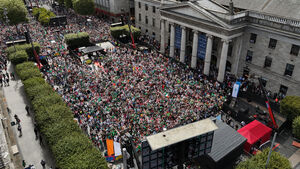Fallon's Town Talk: What happens when the Olympics feelgood factor fades?

A general view of thousands of people gathered along Dublin's main thoroughfare to celebrate the homecoming by Irish Olympians, after the most successful medal haul ever at the Paris 2024 Olympic Games.
It will be discombobulating to turn on the television this week, expecting to watch the Olympics and they won’t be there – replaced instead by a slew of silly season programmes or repeats.
This Olympiad captured the imagination of the Irish public in a way few major sporting events have before. The comparisons of the euphoria levels with Italia 90 are valid. Paris, as with London 2012, was like having a ‘home’ Olympics.
Supporters flocked to France to support Ireland’s largest ever team and, for those at home, the one-hour time difference meant the television schedules aligned ideally with people’s daily routine.
However, in this era of short attention spans, what happens when the feelgood factor fades? The Premier League juggernaut returns next week, threatening to push all other sports to the margins. Elite soccer and rugby have become virtually all-year round activities. The Olympic Federation of Ireland has to strike now and make their case forcibly to the government for increased funding for both coaching resources and facilities.
Last Sunday a Wicklow indoor cyclist called Lara Gillespie finished 10th in the Women’s Omnium – an event which presumably nobody apart from cycling aficionados knew about until last week – despite Ireland not having an indoor velodrome. Gillespie used her moment in the sun to call for that velodrome to be built.
It was fantastic that 31 counties were represented in Paris with Aoife O’Rourke Roscommon’s standard-bearer. Like so many other Olympians, Aoife and her sister Lisa have emerged as elite practitioners of their chosen sport through a combination of graft, determination, superb coaching and possessing world-class talent.
In 2021 Aoife became Roscommon’s first Olympian since Dr Martin Feeley in rowing in 1976. If boxing isn’t on the programme in Los Angeles in 2028 are there other prodigious Rossie talents who will get the opportunity, along with the financial and coaching support, for their capabilities to flourish?
On Saturday night Olympic bronze medal winner Rob Heffernan called on the government to double funding and start sending athletics coaches into primary schools, following the GAA model. Fellow RTÉ analyst Derval O’Rourke called for regional hubs, which surely struck a chord with those trying to spread the popularity of athletics, swimming, boxing and other Olympic sports in rural counties like Roscommon.
O’Rourke also had no qualms about calling on RTÉ to give coverage to those sports, apart from just the Olympics and major championships.
Bizarrely, athletics was far more prominent on our TV screens in the 1970s and 1980s when a programme called ‘Sports Stadium’ used to dominate RTÉ 1’s Saturday schedule. Of course, it helped that Eamon Coghlan and John Treacy were in their pomp.
Although this was Ireland’s most successful ever Olympics, there were a few pebbles in the shoe. Aoife O’Rourke and Ciara Mageean were denied the chance to fulfil their potential by different, but heartbreaking, misfortunes while Rhasidat Adeleke finished fourth in a 400m final in which the second-placed athlete has served a two-year ban for missing drugs tests.
The cruelty of the Olympics was underlined by the fourth-place finish of the women’s 400m relay quartet – one of the outstanding Irish sporting teams of the 21st century at their peak who were denied a medal by one metre.
Medals came to all four provinces, but Connacht’s hero, Mona McSharry, has said Paris will be her swan-song. Kellie Harrington, who has surely proved herself Ireland’s best-ever amateur boxer, has retired. Rowers Paul O’Donovan, Ireland’s greatest-ever Olympian, and Fintan McCarthy must move from lightweight to heavyweight sculls.
Recently, in the space of one week, Paddy Beirne and Brendan Boyle, the presidents of Tremane and Athleague hurling clubs respectively, passed away. The two men shared many traits, not least their love of hurling, farming and, most of all, their families.
The most notable characteristic that Paddy and Brendan shared was that they were gentlemen, in every sense of that word. I knew both of them all of my life, and it was a privilege.
The phrase “pillars of the community” could have been coined with them in mind as Brendan and Paddy represented the very best of the Ireland in which my generation grew up. May they rest in peace.





